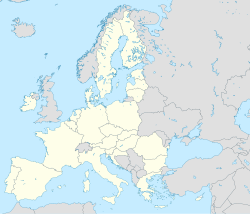History and structure
EMSA was founded in 2002, after the EU adopted substantial packages of legislation relating to maritime security in the wake of major shipping disasters in European waters, such as those involving the ferry Estonia and the oil tankers Erika and Prestige. It was felt that a specialised technical agency was necessary to overview the enforcement of this legislation and help in its implementation.
EMSA is headquartered in Lisbon, Portugal, and moved in June 2009 to new, purpose-built premises near Cais do Sodré in central Lisbon. It has a staff of just under 200 and operates a small network (at the end of 2009, 16 vessels) of stand-by oil recovery vessels contracted from the commercial sector, designed to provide top-up capacity to Member States' own response resources. [2] Its executive director, since 1 January 2019, is Maja Markovčić Kostelac from Croatia. [3] The 2008 budget for EMSA was just over EUR 50,000,000, of which over a third, EUR 18,000,000 is specifically used for at sea pollution response tasks.
This page is based on this
Wikipedia article Text is available under the
CC BY-SA 4.0 license; additional terms may apply.
Images, videos and audio are available under their respective licenses.



